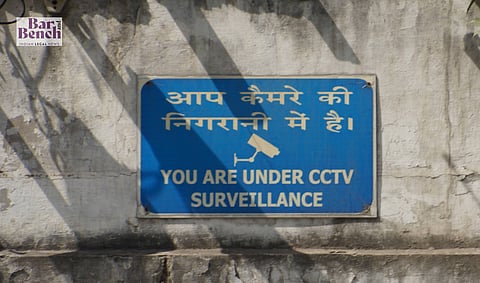
- Latest Legal News
- News
- Dealstreet
- Viewpoint
- Columns
- Interviews
- Law School
- Legal Jobs
- हिंदी
- ಕನ್ನಡ

The Supreme Court on Monday said that it is contemplating setting up of fully automated control rooms without any human intervention to flag non-functional CCTV cameras in police stations.
A Bench of Justices Vikram Nath and Sandeep Mehta expressed that such a measure seems to be the only way to tackle the issue of police switching off CCTV cameras or deleting the recordings.
The Court also said that it may involve an independent agency like Indian Institute of Technology (IIT) to help in setting up the mechanism.
"We were thinking of a control room in which there is no human intervention. So all feeds are provided to the control room. Any camera goes off, there is a flag. That is the way this thing can be tackled. There is no other way. Initially, there has to be inspections of police station also by an independent agency... We may of think of involving some IIT to provide a mechanism so that every CCTV feed is monitored at a particular place. Even monitoring should not be human," Justice Sandeep Mehta said today.
The Bench was hearing a suo motu case registered earlier this month on the lack of functional CCTV cameras in police stations after a report in Dainik Bhaskar newspaper revealed 11 custodial deaths in the past 7–8 months.
Notably, the Supreme Court had passed a ruling in 2020 making it mandatory to install Closed Circuit Television Cameras (CCTVs) in police stations in the matter of Paramvir Singh Saini v. Baljit Singh & Others.
At the time, the Court had ordered all States and Union Territories to install CCTVs with night vision cameras in each and every police station across the country.
The top court had also directed the Central government to install CCTV cameras at the offices of Central Bureau of Investigation (CBI), National Investigation Agency (NIA), Enforcement Directorate (ED), Narcotics Control Bureau (NCB), Department of Revenue Intelligence (DRI), Serious Fraud Investigation Office (SFIO) and any other central agency office where interrogation of people is carried out.
During today's hearing, Senior Advocate Siddhartha Dave gave the Court an overview of States that have complied with the top court's orders in Paramvir Singh Saini's case, and those States that are yet to do so. Compliance affidavits on the same were submitted.
"The issue is of oversight. Today there is a compliance affidavit, tomorrow, police officer switch off or divert the cameras. In that case what happens?" the Court asked.
The Bench proceeded to suggest that a monitoring mechanism that involves minimal human interference may have to be put in place.
Dave, meanwhile, contended that the Central government itself is yet to comply with the Court's directives.
"The glaring fact is that Union of India, which has 2-4 investigation agencies, hasn't complied....I can assist your lordship in this matter also..." he said.
The Court proceeded to post the case for orders on September 22.
"Orders reserved. List on next Monday for orders," it said.
[Live Coverage]